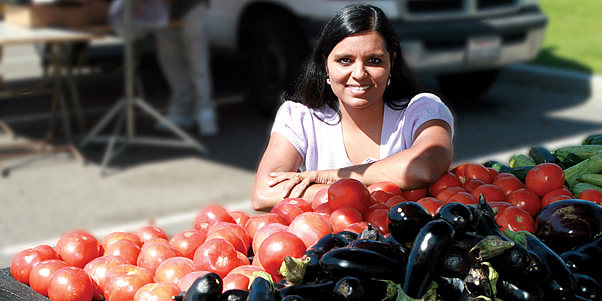Counting Cultural Calories
Professors Study Native Hawaiian Diet for Designing Obesity-Preventing Eating Plan
July 21, 2009
By Mimi Ko Cruz

From left: Shauna Winston, Archana J. McEligot, Ka'ala Pang, Juliet McMullin, Louise Bone and Rebekah Ngewa
Cal State Fullerton researchers are collecting lifestyle data of native Hawaiians who live in Southern California in an effort to combat obesity.
Preliminary results of a survey of 62 subjects show that 91 percent are obese or overweight, but eager to improve their health, said Archana J. McEligot, associate professor of health science and the lead study investigator.
She noted that more than half the study participants had preexisting health conditions due to lifestyles that include little to no exercise and a diet low in fruits, vegetables and whole grains. They voiced concern about health issues such as diabetes and cardiovascular disease, McEligot added, "suggesting that the native Hawaiian community is aware of health issues and is willing to improve overall community health."
The data suggests that implementation of an effective dietary intervention that is socially, culturally and ethnically specific for native Hawaiians in Southern California is critical, she said. “The conclusion is that an intervention should be developed.”
Before doing so, McEligot said, “it’s important to see where the community is in terms of nutrition/diet and behavioral factors related to nutrition and physical activity.”
That’s why the study — “Behavior and Beliefs Related to Diet in Native Hawaiians in Southern California,” funded by a $71,872 National Institutes of Health grant — is being conducted by McEligot and a team of researchers: Juliet McMullin, assistant professor of anthropology at UC Riverside; Ka’ala Pang and Louise Bone, native Hawaiian community leaders; and Cal State Fullerton health science graduates Shauna Winston and Rebekah Ngewa.
As part of the research, dietary, body mass index measurements and psychosocial data were collected.
“The dietary data indicate that native Hawaiians residing in Southern California should aim to increase their vegetable, fruit, fiber and whole grains,” McEligot said, adding that the subjects reported that they are motivated to make dietary changes.
In addition, subjects reported that they lack social support for exercising and eating a healthy diet.
McEligot said her aim is to design interventions tailored to native Hawaiians by incorporating ohana (family) and group values while encouraging increased consumption of vegetables and foods rich in fiber and whole grain.


